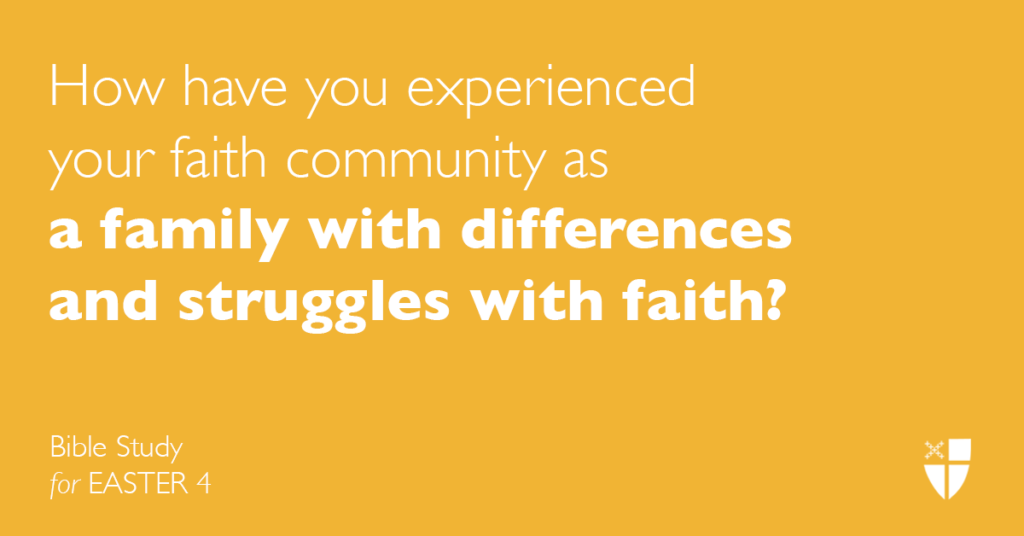This page is available in: Español
Bible Study: Easter 4 (B) – 2021
April 25, 2021
RCL: Acts 4:5-12; Psalm 23; 1 John 3:16-24; John 10:11-18

Acts 4:5-12
This is a dangerous moment for Peter and John, having just been arrested after the healing of the crippled man at the Temple and their teaching about Jesus’ resurrection. Peter’s courage in the face of interrogation before the gathered court is striking; he speaks the truth about Jesus as the source of healing, and he speaks plainly about what those authorities have been party to: the rejection and killing of Jesus. This disciple, this regular Joe, stands up to the learned and powerful. We might recall that Peter hasn’t always been so courageous. Here, the source of his courage is the Holy Spirit. It fills Peter and calls him to witness to who Jesus is and what he does: saves and heals. By the power of the Holy Spirit, Peter carries out his call to witness.
- What are other examples you can think of – perhaps modern examples – of Christians speaking truth to power when it was dangerous to do so?
- Is there an experience you can share of something you did that felt impossible or frightening where you sensed the help of the Holy Spirit?
Psalm 23
Psalm 23 is perhaps the most well-known and beloved of the psalms. It describes the relationship between God the Shepherd and the psalmist David. It’s easy to see why this psalm would be beloved; it’s a beautiful and comforting description of the most trusting of relationships. Scholars have called it a “Song of Trust”. The Shepherd guides, refreshes, and nourishes the sheep. Nothing is lacking. And everything provided by the Shepherd is the best. “Green pastures” versus sparse ones, water that is safe and restorative as opposed to rushing torrents or stagnant pools. The Shepherd guides the sheep in the right direction, instead of dangerous ones. Even with trouble all around, God is present and protecting, and God’s care is plentiful.
In Hebrew, “mercy” is sometimes translated as “loyal love,” indicating a covenantal relationship with all of the obligations of deep commitment. It’s a two-way relationship, but one in which the sheep – us – are blessed with all of the best God has to offer.
- Do you feel loved, protected, sustained by God?
- This psalm declares that God wants to meet all of our needs and lovingly care for us. When have you found yourself trusting – or not trusting – in his care?
- Can you describe a time of danger or darkness in your life when you felt the shepherding of God?
1 John 3:16-24
So much is happening in this passage. There’s a call to believers to set aside one’s own life in order to take care of those in need. There’s a caution against hypocrisy. There’s a how-to guide on responding to the call of the conscience. There’s God’s response to prayers. And there’s a call to be like Jesus. So much to take away!
This is a letter to a community – a family – of believers in which there are – as with all communities – problems. There’s wavering in the belief in Jesus and perhaps some fear about the dangers of being a believer. John calls the community to love and defines love. Love is a verb: evidenced by action, not by words. And, John says, God knows our hearts; God knows our consciences. By truth and action, our hearts are transformed. Our actions and our prayers become an output of love and are met with God’s “Yes”.
- How have you experienced your faith community as a family with differences and struggles with faith?
- How have you experienced love as a call to selflessness? What does it mean to you to “lay down our lives for one another”?
- Recall a time when you’ve experienced the transformation brought by living out the love for one another that God commands of us.
John 10:11-18
God desires unity, and God is willing to go to any length for it as we see in the theme of laying down one’s life that threads throughout today’s readings. Jesus’ desire for unity demonstrates his commitment and great love. He gives his life voluntarily; no one takes it from him. He does this in order to gather all his sheep into one inclusive gathering of all of God’s people. There is great hope in this promise, this yearning, because, as Jesus says, just as he gives his life, so can he take it back again. As this desire to be united provided hope for the Gentiles and others, so too does it provide hope for those on the margins today.
- Inherent in this passage is a message of protection and care that we see in Psalm 23. What does this combination of deep care and God’s desire for “one flock” say to you about God’s love for you?
- What do you need to “lay down” in your life in order to bring about the kind of unity Jesus describes?
This page is available in: Español
Don’t forget to subscribe to the Sermons That Work podcast to hear this sermon and more on your favorite podcasting app! Recordings are released the Thursday before each liturgical date.
Receive Free Weekly Sermons That Work Resources!
This page is available in: Español


